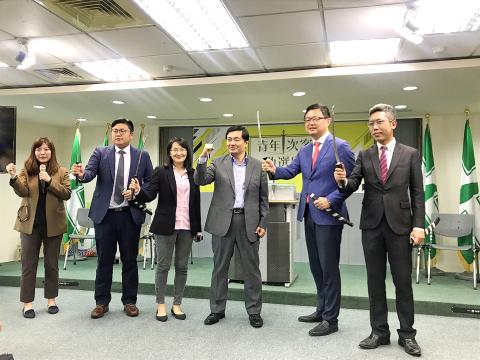The Democratic Progressive Party (DPP) is to present a new main campaign message for the Nov. 24 nine-in-one elections in hopes of energizing its base, a DPP official said yesterday.
“Reform for the next generation” was the campaign message the party had rolled out in July.
However, due to a perceived lack of enthusiasm, the DPP leadership, in a bid to energize the party base, is planning to present “no backtrack from reforms” and “protect Taiwan together” as the new campaign slogans, a senior party official said, speaking on condition of anonymity.

Photo: Su Fang-ho, Taipei Times
The new campaign message would resonate with President Tsai Ing-wen’s (蔡英文) address on Double Ten National Day, they said.
The DPP has lost ground in opinion polls, with margins narrowing even in Kaohsiung, which has for a long time reliably voted for the DPP, the official said.
In light of such developments, energizing and motivating the base tops the agenda for DPP strategists, who are increasingly looking to attack as a way to wrest control of the debate from the Chinese Nationalist Party (KMT), the official added.
The DPP legislative caucus has held a series of news conferences to slam the KMT over its alleged forgery of signatures on referendum petitions.
Presidential Office Secretary-General Chen Chu (陳菊) has also maintained high visibility on the campaign trail with hard-pressed DPP candidates, stumping for hopefuls in Miaoli County and helping to coordinate the DPP’s strategy in Yilan County.
The DPP Youth Organization yesterday launched a campaign team of young political appointees who are to act as “campaign surrogates” for DPP candidates.
The DPP governs 13 counties and cities, and mayoral elections in the special municipalities of Taoyuan, Taichung, Tainan and Kaohsiung are deemed safe, DPP Secretary-General Hung Yao-fu (洪耀福) said yesterday.
However, the party faces a tough race for the commissionership in Yilan County, while Changhua County and Chiayi City are toss-ups, he said.
The DPP aims to wrest New Taipei City from the KMT and it also has high hopes for Taitung County, he added.
Asked whether the campaign surrogates could compromise the political neutrality of government administration, Hung said that all officials assisting campaigns have taken leaves of absence.
Additional reporting by Su Fang-ho

A strong continental cold air mass is to bring pollutants to Taiwan from tomorrow, the Ministry of Environment said today, as it issued an “orange” air quality alert for most of the country. All of Taiwan except for Hualien and Taitung counties is to be under an “orange” air quality alert tomorrow, indicating air quality that is unhealthy for sensitive groups. In China, areas from Shandong to Shanghai have been enveloped in haze since Saturday, the ministry said in a news release. Yesterday, hourly concentrations of PM2.5 in these areas ranged from 65 to 160 micrograms per cubic meter (mg/m³), and pollutants were

Taiwan’s armed forces have established response protocols for a wide range of sudden contingencies, including the “Wan Chun Plan” to protect the head of state, the Ministry of Defense (MND) said today. After US President Donald Trump on Saturday launched a series of airstrikes in Venezuela and kidnapped Venezuelan President Nicolas Maduro, concerns have been raised as to whether China would launch a similar “decapitation strike” on Taiwan. The armed forces regularly coordinate with relevant agencies and practice drills to ensure preparedness for a wide range of scenarios, Vice Minister of National Defense Hsu Szu-chien (徐斯儉) told reporters before a

EVA Airways on Saturday said that it had suspended a pilot and opened an investigation after he allegedly lost his temper and punched the first officer several times as their plane was taxiing before takeoff at Los Angeles International Airport. According to a report published on Thursday by The Reporter, the incident occurred after the flight’s Malaysian first officer tried to warn the Taiwanese pilot, surnamed Wen (文), that he was taxiing faster than the speed limit of 30 knots (55.6kph). After alerting the pilot several times without response, the first officer manually applied the brakes in accordance with standard operating

NOT AN OPENING: Trump’s violation of international law does not affect China’s consideration in attacking Taiwan; Beijing lacks capability, not precedent, an official said Taiwanese officials see the US’ capture of the president of Venezuela as a powerful deterrent to Beijing’s aggression and a timely reminder of the US’ ability to defeat militaries equipped with Chinese-made weapons. The strikes that toppled Venezuelan President Nicolas Maduro signaled to authoritarian leaders, including Chinese President Xi Jinping (習近平), US President Donald Trump’s willingness to use military might for international affairs core to US interests, one senior official in Taipei’s security circle said. That reassured Taiwan, the person said. Taipei has also dismissed the idea that Trump’s apparent violation of international law could embolden Beijing, said the official, who was not